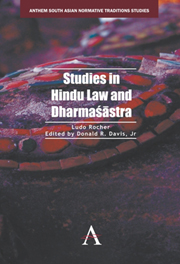Book contents
- Frontmatter
- Contents
- Foreword by Richard W. Lariviere
- Preface
- Abbreviations
- Note on the Edition
- Introduction
- PART ONE THE NATURE OF HINDU LAW
- PART TWO GENERAL TOPICS OF HINDU LAW
- Ancient Hindu Criminal Law
- Hindu Law of Succession: From the Śāstras to Modern Law
- Caste and Occupation in Classical India: The Normative Texts
- Megasthenes on Indian Lawbooks
- The “Ambassador” in Ancient India
- The Status of Minors according to Classical Hindu Law
- Quandoque bonus dormitat Jīmūtavūhanas?
- Notes on Mixed Castes in Classical India
- Inheritance and Srāddha: The Principle of “Spiritual Benefit”
- The Theory of Matrimonial Causes According to the Dharmaśāstra
- Jīmūtavūhana's Dāyabhāga and the Maxim Factum Valet
- The Divinity of Royal Power in Ancient India according to Dharmaśāstra
- A Few Considerations on Monocracy in Ancient India
- PART THREE HINDU LEGAL PROCEDURE
- PART FOUR TECHNICAL STUDIES OF HINDU LAW
- PART FIVE ANGLO-HINDU AND CUSTOMARY LAW
- Bibliography
- Index
The Divinity of Royal Power in Ancient India according to Dharmaśāstra
from PART TWO - GENERAL TOPICS OF HINDU LAW
Published online by Cambridge University Press: 05 February 2013
- Frontmatter
- Contents
- Foreword by Richard W. Lariviere
- Preface
- Abbreviations
- Note on the Edition
- Introduction
- PART ONE THE NATURE OF HINDU LAW
- PART TWO GENERAL TOPICS OF HINDU LAW
- Ancient Hindu Criminal Law
- Hindu Law of Succession: From the Śāstras to Modern Law
- Caste and Occupation in Classical India: The Normative Texts
- Megasthenes on Indian Lawbooks
- The “Ambassador” in Ancient India
- The Status of Minors according to Classical Hindu Law
- Quandoque bonus dormitat Jīmūtavūhanas?
- Notes on Mixed Castes in Classical India
- Inheritance and Srāddha: The Principle of “Spiritual Benefit”
- The Theory of Matrimonial Causes According to the Dharmaśāstra
- Jīmūtavūhana's Dāyabhāga and the Maxim Factum Valet
- The Divinity of Royal Power in Ancient India according to Dharmaśāstra
- A Few Considerations on Monocracy in Ancient India
- PART THREE HINDU LEGAL PROCEDURE
- PART FOUR TECHNICAL STUDIES OF HINDU LAW
- PART FIVE ANGLO-HINDU AND CUSTOMARY LAW
- Bibliography
- Index
Summary
In order to avoid any misunderstanding about the bearing of the remarks contained in the present paper, I feel obliged to draw the reader's attention to its very distinct limitations. As expressed in the title, the present paper deals with the divinity of royal power in ancient India according to the texts on Dharmaśāstra.
I do not propose to deal with and to make pertinent statements about the problem of the divinity of royal power in ancient India generally. There are several reasons for my imposing the restriction according to the Dharmaśāstras.
The main reason is that I am aware of the limitations of my knowledge. There are so many aspects to the problem of the divinity of royal power, that I have not been able yet to closely examine all sources dealing with the problem.
To quote just a few examples:
1. A complete survey of the problem should start with a thorough survey of the situation in Vedic times (cf. Schlerath 1960).
2. Next it should turn its attention to the period of the Brāhmaṇas. I think, for instance, of the numerous data that could be drawn from a close examination of the rājasūya the royal consecration ceremony as described in the Brāhmaṇas belonging to the various Vedic schools. However, in order to show the difficulties involved in only this single aspect, I shall refer to the fact that a Dutch scholar spent several years studying the rājasūya according to the Yajus school of the Veda alone (cf. Heesterman 1957). […]
- Type
- Chapter
- Information
- Studies in Hindu Law and Dharmasastra , pp. 315 - 330Publisher: Anthem PressPrint publication year: 2012

